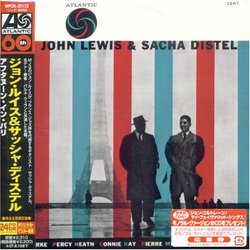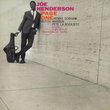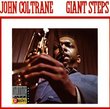| All Artists: John Lewis, Sacha Distel Title: Afternoon in Paris (Mlps) Members Wishing: 0 Total Copies: 0 Label: Wea Japan Original Release Date: 1/1/2006 Re-Release Date: 1/1/2007 Album Type: Import, Limited Edition Genres: Jazz, Pop Styles: Cool Jazz, Bebop Number of Discs: 1 SwapaCD Credits: 1 |
Search - John Lewis, Sacha Distel :: Afternoon in Paris (Mlps)
 | John Lewis, Sacha Distel Afternoon in Paris (Mlps) Genres: Jazz, Pop
Limited Edition Japanese pressing of this album comes housed in a miniature LP sleeve. Atlantic. 2007. |
Larger Image |
CD DetailsSynopsis
Album Description Limited Edition Japanese pressing of this album comes housed in a miniature LP sleeve. Atlantic. 2007. Similar CDs
|
CD ReviewsA long overdue reissue Benj Thomas | 07/25/2000 (5 out of 5 stars) "this album was a bit of a sleeper (despite good critical reviews) when it came out. it is wonderful music, with superb work by French musicians generally unknown in the US. Barney Wilen on TS and Sacha Distel on G are remarkable jazz artists. Wilen sounds very modern for the time, aand Distel is a powerful, thoughtful guitarist. Lewis's peculiar genius shines through on this disk. One you will be glad to get,, one I was delighted to discover was available. My college roommate had the LP and I have been looking for it for 30(!) years." A Solid Album Missing Something! Kevin Currie-Knight | Newark, Delaware | 09/23/2006 (4 out of 5 stars) "As a fan of the lyrical side of jazz, I like this album fine. But as a fan of lyrical jazz, I am also aware that sometimes lyriclsm can come at the expense of that "bite" necessary to hold a listener's interest. I cannot say that this album is flat, but would certainly suggest that it is not one in which there is a whole lot of excitement, either. A very safe album. But I did give it four stars (closer to three-and-a-half) so let's focus on the good stuff first. First, if you are a fan of lyrical jazz of the ilk so often neglected by chops-driven bebop, this is a very good album for you. Such melodic players as John Lewis and Frenchmen Barney Wilen (ts) and Sacha Distel (gtr) make this album very easy to listen to. Lewis creates terse piano lines and comping throughout, while Wilen and Distel produce some very wistful (in a good way) and melodically rich solos. the rhythm section (MJQ"s Connie Kay (dr) amd Percy Heath (b)) show that they can swing with deceptive and slick quietude. (Just listen to "Willow Weep for Me" which grooves hard while retaining great sensitivity.) The problem is that when ALL of the players subscribe to the same 'minimalist' soloing and comping style, an album often falls flat. One of the things that made the MJQ work so well, for instance, was the contrast between the winding chopsy style of Jackson's vibes and the terse, economical style of Lewis's piano. [The same could be said for Brubeck and Desmond.] Here, there is no such contrast. All of the players are the type who terse and economical. And while that can lead to an album of good soloing, it does not leave any internal tension in the music. Sometimes, this means that good music occasionally becomes monotonous, as is the case here. But I do give the album four stars (would have preferred three and a half). the music is solid and Lewis is quite inventive in his piano intros to songs. The song choices themselves were also good, all of which are open enough to lend themselves well to lyricism. If you are a fan of the more melodically driven approach to jazz - as opposed to chops-infused bebop - this is a good album to hear. But it is by no means a great album. (For that, I would suggest MJQ's "Django" or Paul Desmond's "Easy Living.")" A great session,introducing two young french musicians JEAN-MARIE JUIF | BESANCON France | 03/05/2003 (5 out of 5 stars) "This very beautiful record,made in 1957,is a great one. First,because it features the MJQ's piano player, John Lewis.Second,because there are two immense drummers,Kenny Clarke and Connie Kay (a member of the MJQ).Third,because Percy Heath plays bass on 3 tunes.Fourth,because it features three very great french players: Pierre Michelot on bass,the very young Barney Wilen on tenor sax (19 years old at this time), and the 22 years old Sacha Distel on guitar.Sacha ,46 years later,always plays jazz guitar,sometimes,but this guy,who is Ray Ventura's nephew and Norman Granz' god-child,became famous as a singer.
This record gives you the opportunity of, first,listening to very great jazz music, and second,meeting the very talented tenor sax of Barney Wilen,who left us a few years ago in his fifties.There is one of the most moving versions of "Dear old Stockholm" I've ever heard.Listen to John Lewis' deeply Bach-oriented solo, listen to Wilen's outstanding tenor;a tenor which combines strong influences of Pres,Hawkins.Listen to Ann Ronnell's evergreen,"Willow weep for me";to Milt Jackson's "Bag's groove";to Lewis' "afternoon in Paris".Here is some very swinging music.But this record is more important than this: here is the birth of a new generation of french jazz players,who can compete with american players.Really,a great session. It would be a mistake to miss it." |

 Track Listings (6) - Disc #1
Track Listings (6) - Disc #1

